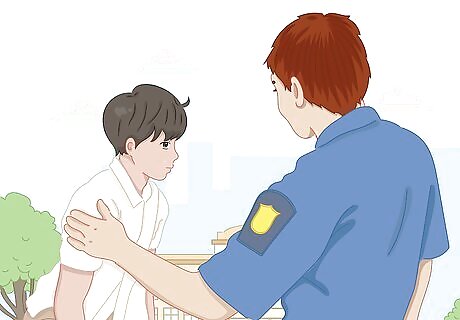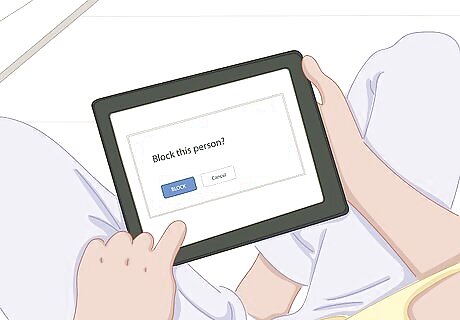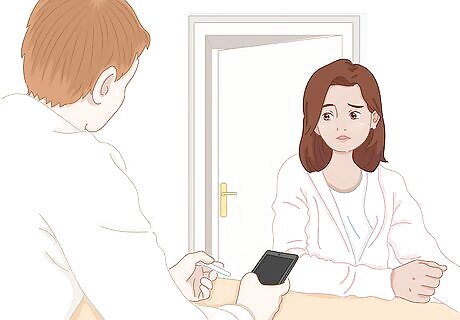
views
Stay calm and keep your face neutral.

Ignore your bully. The best advice to avoid bullies who are nearby is to not talk to them or even look them in the eye. They may throw insults at you, but what they want is a reaction so keep your cool. If a bully follows you, walk toward an adult. This may be difficult to do, but this is the best way to save yourself from becoming victimized. Tune out the bully and focus on taking deep breaths.
Ignore the bully and walk away.

Walking away without reacting discourages the bully. Hopefully, ignoring them and walking away is enough to get them to leave you alone. If the bully is stubborn and starts following you, you’ll need to switch strategies. EXPERT TIP Jennifer Clark Jennifer Clark Life Coach Jennifer Clark is an Evolution Coach and the Founder of Soulful Solutions, her life consulting business which helps both individuals and organizations evolve and grow into their full potential based in Ottawa, Ontario, Canada. She has over 20 years of experience assisting over 8000 individuals with life consulting, workshop facilitation, and public speaking training. She received a Risk Management Certification from the Sprott School of Business in 2000, an Integrated Energy Therapy Master and Instruction Certificate in 2004, and an Assertiveness Coach Certificate in 2015. She earned a BA with Honors in Political Science from Queen's University in 1992. Jennifer Clark Jennifer Clark Life Coach Bullying isn't your fault. If you're on the receiving end of negative energy, keep in mind that the other person is revealing their own flaws. For instance, a bully is insecure and feels unsafe, so they use aggression or a loud voice as a way of staying safe. If you see someone being bullied, create a distraction or walk up and tell the victim something like, "Hey, Mr. X wants to see you in his office. He said to come immediately so you’d better go.”
Tell them to stop in a neutral tone of voice.

Raising your voice or responding angrily can make things worse. If walking away doesn’t work, tell the bully to stop in a calm, polite, unemotional voice. Speaking in a neutral voice gives the bully no reason to feel challenged or threatened by you. You could say: ”Knock it off, I have to get to class.” ”Get a life. Leave me alone.” ”Just stop it. You’re bothering me.” If you're a bystander, don't laugh at or encourage the bully, since this gives them the attention they crave. If it feels safe, say something like, "That's really not funny," or "Take it easy, dude."
Hang around other students as much as you can.

If the bully can’t get you alone, they’re less likely to mess with you. Make a deal with a buddy to walk with you between classes. If that’s not possible, take different hallways or alternate routes to get around so the bully is less likely to find you in your usual spots. Go to the bathroom with a friend and eat lunch in a group so other people are always nearby. If you’re on the bus, sit near the front so the bus driver is within earshot.
Talk to someone you trust about the bullying.

Keeping the bullying a secret is what the bully wants. Being the target of bullying is not your fault and you don’t have to go through it alone. Your friends, family members, teachers, and school counselors do not want this for you. Tell them what’s going on so they can help you and support you. Bottling up your emotions can be really harmful. Talk to someone.
Tell school authorities to make the bully stop.

Adults need to know what’s happening so they can take action. Tell your principal or go to your school counselor and tell them you want to escalate the situation to a school authority. Every student has the right to feel safe in their school environment. Ask them what they plan to do to stop the bully. Will the bully be disciplined? If so, how and when? If disciplining the bully doesn’t end the behavior, find out if the bully can be transferred to other classes or another school. If you're the victim of sexist, racist, or homophobic slurs, reach out to teachers involved in student groups trying to combat sexism, racism, and homophobia. Ask if you can join and help spread awareness about these issues.
Go to the police if physical violence is involved.

Report physical violence to the police to take legal action. If you’re threatened or beaten at school, go to your principal or guidance counselor immediately. Tell them what happened and say you want to file a police report. Ask them to help you do that right now. If there were witnesses, bring them with you so they can vouch for you and confirm the facts.
Treat cyberbullying as seriously as other bullying.

Cyberbullies can harass you 24/7 and you can't let that continue. Cyberbullying is when someone uses the internet or social media to bully or harass you. If someone is insulting you on Facebook or Twitter, emailing you unwanted images, saying rude things on your Instagram pictures, or posting your personal information, pictures, or videos online to humiliate you, this is cyberbullying. You don’t have to keep quiet or suffer through it.
Do not respond to a cyberbully.

Take a deep breath, stay calm, and get away from your phone/computer. Interacting with a cyberbully gives them what they want, so don't do it. Block their social media accounts and phone number so they can’t get to you that way. Make your social media profiles private and change your email address. Consider temporarily disabling comments on your social media accounts to stop the harassment. It can be really painful to see hurtful comments or gossip being spread about you on social media. You may want to delete or disable your profiles until the situation is under control.
Tell your friends, family, and school about the cyberbully.

Cyberbullying is serious and you need to take action to make it stop. Teenagers are usually hesitant to tell their parents about cyberbullying because they’re afraid their parents will take away their phone/computer. Your parents aren’t going to do that to you! Enlist the help of family and friends for support. Make your teachers and administrators aware of what’s happening so they can help you put a stop to it. Most schools have policies in place for how to handle cyberbullying and there are almost always consequences. Go to the police if there are extreme threats or if you’re scared something really bad might happen to you.

















Comments
0 comment